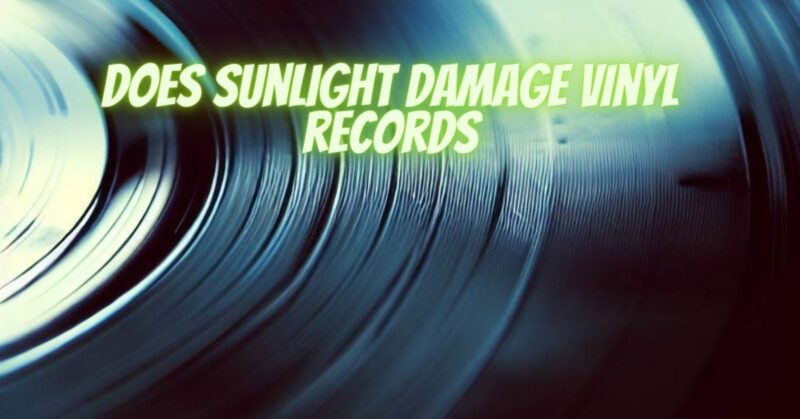Vinyl records are treasured for their timeless sound and nostalgic appeal. As with any delicate material, vinyl records require proper care and protection to maintain their quality and longevity. Sunlight, particularly direct exposure to UV radiation, poses potential risks to vinyl records. In this article, we will explore the impact of sunlight on vinyl records and how to safeguard them from potential damage.
- Heat and Warping: Direct sunlight can elevate the temperature of vinyl records, potentially leading to warping. Vinyl records are susceptible to heat, and excessive exposure to sunlight can cause the records to soften and distort, resulting in warped surfaces. Warped records can cause tracking issues, skips, and audible distortions during playback.
- Fading of Labels and Artwork: UV radiation from sunlight can cause fading and discoloration of labels, artwork, and printed materials on vinyl records. Over time, the vibrant colors and intricate details on the record labels may fade, compromising the visual appeal and historical value of the records.
- Deterioration of Vinyl Material: Prolonged exposure to sunlight, specifically UV radiation, can degrade the vinyl material itself. UV rays can cause chemical reactions within the vinyl, resulting in a breakdown of the polymer structure. This deterioration may lead to increased surface noise, reduced audio fidelity, and diminished playback quality.
- Storage Considerations: It’s not only direct sunlight that can harm vinyl records but also indirect exposure. When storing your records, avoid placing them near windows or in areas prone to significant sunlight exposure. Indirect sunlight can still contribute to increased temperatures and UV radiation, albeit to a lesser extent.
Protective Measures: To safeguard your vinyl records from sunlight damage, consider the following preventive measures:
- Storage in a Cool and Shaded Area: Store your vinyl records in a cool, dark, and shaded area of your home. Avoid storing them near windows or in areas with direct sunlight exposure. Temperature fluctuations and prolonged exposure to sunlight can accelerate vinyl deterioration.
- Use UV-Blocking Sleeves: Invest in high-quality protective sleeves that offer UV protection. These sleeves act as a barrier against UV radiation and help preserve the labels and artwork on your vinyl records.
- Controlled Humidity and Temperature: Maintain optimal humidity levels (around 40-50%) and consistent room temperatures to prevent vinyl records from warping, particularly if your records are stored in an area susceptible to sunlight exposure.
- Dust Covers and Storage Boxes: When not in use, keep your vinyl records covered with dust jackets or in closed storage boxes to protect them from sunlight and dust accumulation.
- Rotate Your Collection: Periodically rotate the records in your collection to minimize prolonged exposure to sunlight. By frequently changing the displayed records, you can ensure equal distribution of exposure.
Conclusion:
Sunlight, particularly UV radiation and heat, poses potential risks to vinyl records. Direct and indirect exposure can lead to warping, fading of labels and artwork, and deterioration of the vinyl material. By storing your records in a cool, shaded area, using UV-blocking sleeves, maintaining optimal humidity and temperature levels, and employing protective measures such as dust covers and storage boxes, you can preserve the quality and longevity of your vinyl collection. Remember, proper care and protection are key to ensuring that your vinyl records continue to deliver exceptional sound quality and evoke the joy of music for years to come.


